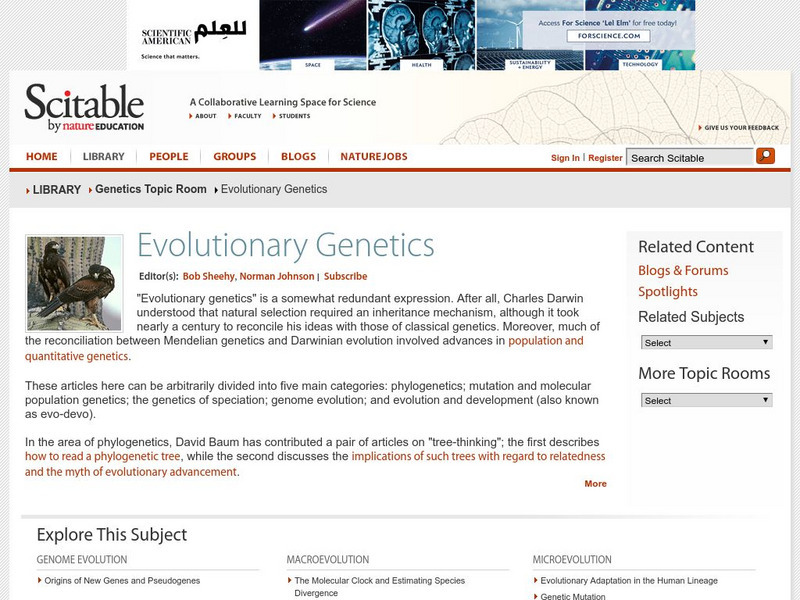Curated OER
Organizing Principles of Plants and Animals
Three lessons and five assessments are contained in this material. Various paper shapes are sorted as a simulation of biological classification. Learners gather a list of living things that they are familiar with and design a...
Curated OER
Using Amino Acid Sequences to Show Evolutionary Relationships
Junior biologists compare the amino acid sequences from fragments of five different globin molecules. They count the letter differences between each species pair. They construct a graphic representation of the evolutionary relationships...
Curated OER
Tree of Life
Pupils study genetics and evolution. They evaluate a group of organisms and estimate their genetic relatedness. Then they use an online program to check the accuracy of their estimations and make a branching phylogenetic tree which...
Curated OER
Vertebrate Dioramas
Students are able to describe the development of their chosen form of vertebrate life from the past to the present in a four to six page typed paper. They explain the use of phylogenetic tree. Students use the phylogenetic tree to...
Curated OER
Vertebrate Dioramas
Students describe the development of their chosen form of vertebrate life from the past to the present in a four to six page paper. They explain the use of a phylogenetic tree, and use this to exemplify an organism's evolutionary change...
Curated OER
Embryology as Evidence of Evolution
Students observe the two major developmental pathways (protostome and deuterostome). They analyze data regarding differences in nucleotide sequences and construct a phylogenetic tree. They observe the similar evolutionary history shared...
Curated OER
An Automobile Phylogenetic Tree
Students study a list of cars and trucks and think about characteristics that can be used to show an "evolutionary relationship". From the characteristics they identity, students construct a phylogenetic tree to show how the automotive...
Curated OER
Applied Evolution: How Will We Get There from Here?
Students explore the basic process of natural selection and how people can manipulate that process today. The consequences of natural selection on daily life and the implications of evolutionary biology in basic and applied science is...
Curated OER
The Phylogenetic Tree
In this biology instructional activity, students label parts of a phylogenetic tree and differentiate between bilateral symmetry and radial symmetry.
Science Buddies
Science Buddies: Neanderthals, Orangutans, Lemurs & You; A Primate Reunion
You have probably seen figures showing how human beings are related to chimpanzees, gorillas, and other primates. In this genomics science fair project, you will use bioinformatics tools to generate your own primate family tree.
Nature Research
Scitable: Evolutionary Genetics
A collection of articles on evolutionary genetics focusing on the topics of phylogenetics, mutation and molecular population genetics, the genetics of speciation, genome evolution, and evolution and development. Learn how to read a...
National Institutes of Health
National Center for Biotechnology Information: Phylogenetics Factsheet
A detailed website that explains the history and process of classifying animals using evolutionary, molecular, and physical characteristics relationships. Website also contains information on evolution and evolutionary processes....
Biology Corner
Biology Corner: Cladogram Analysis
A lesson plan where students analyze a cladogram to understand a derived characteristics between a group of organisms. After analyzing the prepared cladogram, students create their own.
American Institute of Biological Sciences
Action Bioscience: Animals: Tracing Their Heritage
At some point in our lives we all become inquisitive about our origin, our familial heritage. Plenty of folks around the world study their personal genealogy. What about animals? Scientists are constantly studying the origin of present...
Estrella Mountain Community College
Online Biology Book: Biological Diversity: Classification
Explore the classification of living things in this online, college-level textbook. Learn about taxonomy and its history through diagrams and descriptive information.
National Health Museum
Nhm: Amino Acid Sequences Show Evolution
This lesson plan focuses on differences in the amino acid sequence of hemoglobin and myoglobin proteins. They use the number of differences to create a phylogenetic tree.
CK-12 Foundation
Ck 12: Biology: Vertebrate Evolution
[Free Registration/Login may be required to access all resource tools.] An overview of vertebrate evolution and when important vertebrate traits evolved.
CK-12 Foundation
Ck 12: Biology: Phylogenetic Classification
[Free Registration/Login may be required to access all resource tools.] Introduces phylogenetic classification and compares it with the Linnaean classification.
CK-12 Foundation
Ck 12: Biology: Linnaean Classification
[Free Registration/Login may be required to access all resource tools.] Introduces Linnaean classification.
National Health Museum
Access Excellence: Making a Phylogenetic Tree Lesson Plan
Constructing phylogenetic trees may be a daunting task for students, but this lesson plan is a simulation of what molecular biologists must do to determine relationships. This plan is for students who have a good grasp of DNA structure...
CK-12 Foundation
Ck 12: Biology: Classifying Organisms Study Guide
This comprehensive study guide covers the main terms and concepts needed for a unit on classifying organisms.
Khan Academy
Khan Academy: Answers to Exploration Questions: Evolution and Human Health
Get the answers to the exploration exercise about how evolution relates to human health.
Annenberg Foundation
Annenberg Learner: Evolution of Tungara Frog Mating Calls
Use molecular information and observe female response patterns to learn about the mating calls of Physalaemus frogs. Examine the evolution of female preference for particular call characteristics.



















